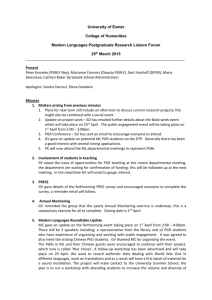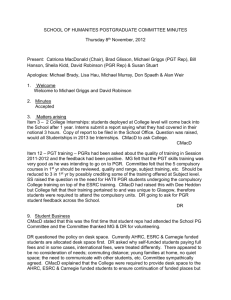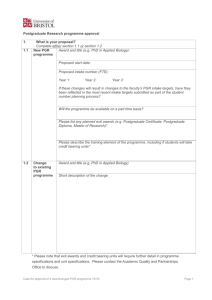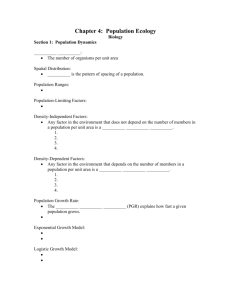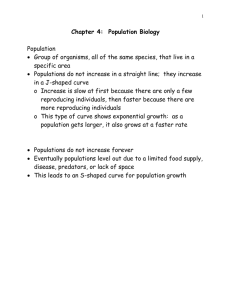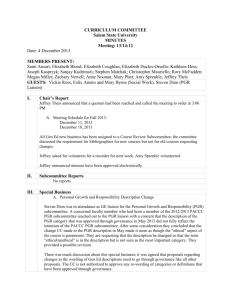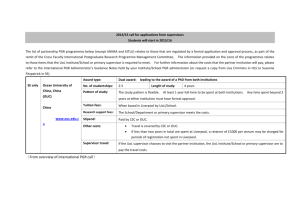Danger Ahead?
advertisement
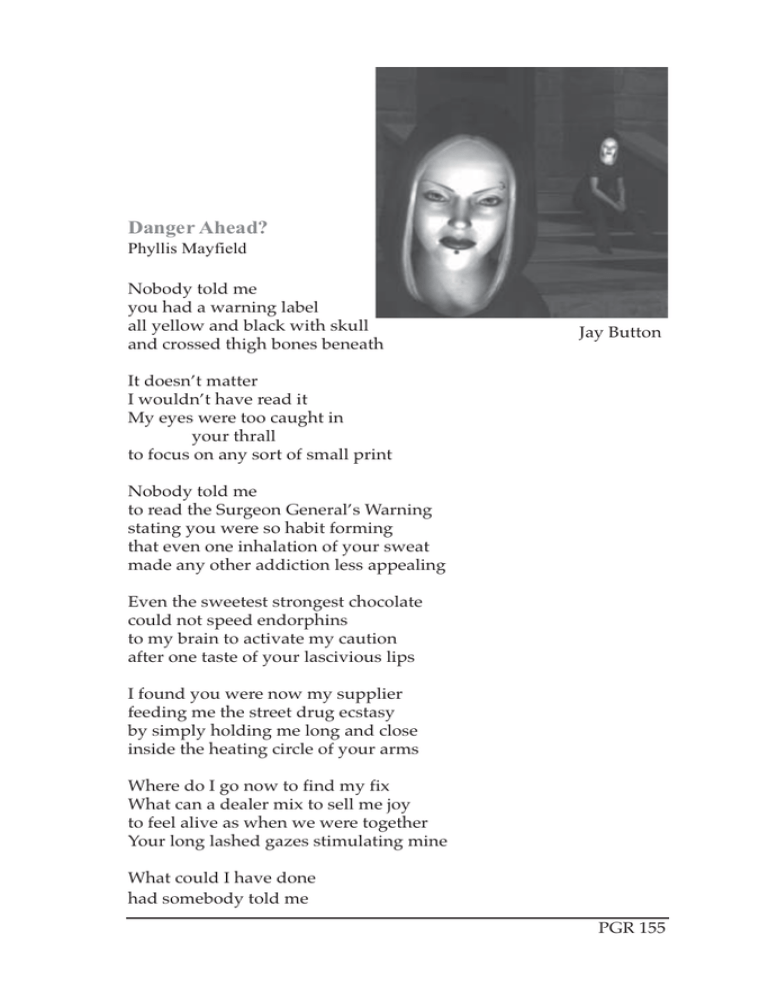
Danger Ahead? Phyllis Mayfield Nobody told me you had a warning label all yellow and black with skull and crossed thigh bones beneath Jay Button It doesn’t matter I wouldn’t have read it My eyes were too caught in your thrall to focus on any sort of small print Nobody told me to read the Surgeon General’s Warning stating you were so habit forming that even one inhalation of your sweat made any other addiction less appealing Even the sweetest strongest chocolate could not speed endorphins to my brain to activate my caution after one taste of your lascivious lips I found you were now my supplier feeding me the street drug ecstasy by simply holding me long and close inside the heating circle of your arms Where do I go now to find my fix What can a dealer mix to sell me joy to feel alive as when we were together Your long lashed gazes stimulating mine What could I have done had somebody told me PGR 155 Lions in the Nursery Neale O. Jones “. . . mere anarchy is loosed upon the world; the blood dimmed tide is loosed, and everywhere the ceremony of innocence is drowned.” -W. B. Yeats The Second Coming The first time you see the bomber it is daylight, under a blue sky so pale it turns white at the horizon. Seen this way, the craft is invincible, the gleaming metal as hard as anything you can imagine. The olive paint, so homogenous, grants the airplane a rangy strength that is comforting, like a grandfather who still tends his potato patch at eighty and never complains. It makes you want to run your palm along its matte surface. Around the plane, the tarmac glints in the late morning sun like the ocean on a calm day, giving way at its edge to a field of lush grass, dark and heavy ladded. The instructor, stern-faced, stands with his booted feet set wide apart and his hands clasped behind his back. His uniform is as crisp as sheet metal, his pilot wings shining on his chest, and this is comforting in much the same way that the plane is, in the sense of definite order. He looks at you, standing amongst a group of men who have not yet given up all of their boyhood, and spits dire warnings at you, punctuated by gruesomely vivid tales to drive the point home.You are quiet out of courtesy for those you know intellectually to have died, but inside you are giddy and disbelieving nothing that this overly serious man is speaking of will ever happen to you. You are not even paying attention to what he is saying: your thoughts are already taking flight and landing again, seeing the world from the interior of security. The spiny guns that poke out from the sides of the airplane have bores the size of an eye socket, ready to issue their powerful defense. You can see bullets glancing off of the fuselage like arrows off the breastplate of a righteous knight. Looking at the aircraft, you feel safer than you have since your mother swept you up and comforted you as a child. No matter how intense your feelings, no one can see the truth. Your genuine emotions hide behind the façade of patriotism, and the ruse fools everyone who wishes to give it credence, even you. You believe you want to kill Gerries. You believe you want to win the war. But the truth is you are naïve and ignorant. And, what is more, everyone of you feels this way. Later, when you speak of this time, you will shake your head in disbelief, if you speak of it at all. For some, looking back on these times of unblemished innocence will be too painful. You PGR 156 will all feel the truth in your insides, though, in visceral memory: the clenching, near-to-bursting feeling of excitement running from throat to bowels upon entering the airplane for the first time, wanting to touch and do everything; a similar feeling of erupting clouds of flame and fear for your own life. The realization of your ignorance does not come slowly, over a long period of time. It does not come during your hasty and incomplete training. It does not come during your transatlantic flight in your glistening airplane. It does not come upon arrival in England, a strange country of greens and grays. Nor does it come while chasing skirts through London dance halls. It does not come upon climbing into your great round aircraft to slice through the wet Basingbourne fog. It does not come when the bright French sun lances between the clouds and through your waist-gunner’s window. When the realization does finally come, it will be in the form of a B-17 bomber aircraft separated from its wing in a brilliant burst of fire and metal. The plane simply falls; no hiccuping attempts at staying aloft, just falls, slowly turning, towards the earth as though it were late for an appointment with Satan. You imagine a whining sound, escalating higher and higher in pitch as the remaining propellers are pushed around faster than the engines want to turn them. Then the plane drops out of your view. There are no parachutes. There were people you knew in that airplane, if only by acquaintance. You can see their faces, white in the English mist. This makes you want to weep and vomit at the same time, but you can do neither because there are clouds of flak bursting black all around you and fighter airplanes buzzing everywhere like deadly gnats. You have finally come to understand that you are trapped inside a watering can with wings flying thousands of feet above the ground. Gone is the liberating sense of confidence and safety, replaced now only by sickening dread. You now know that when your airplane begins to fall, there will probably be no escaping. That you will endure the horrifying descent toward the inevitability of oblivion. You think about this even as you grit your teeth into a feral grin and squeeze the trigger of your machine gun, bullets flying out to trace the trails of your aggressors through the air. It is beyond fight or flight now: the situation is out of your hands. You are reduced to shooting and praying. The flak begins to grow thicker, forming into a mottled and inconsistent fog of gunpowder and shrapnel. This is horribly surprising: you had thought it was already as bad as it would get. The fighters, too, attack with renewed frenzy. They dodge maddeningly in and out of the smoke, materializing and disappearing seemingly too quickly to be defended against. There is a part of you that calls to them, some strange, hopeful whisper in your mind. Stop, stop, please stop, oh God, please stop. It pleads in an unending string of monosyllables. PGR 157 The gun handles have warmed in your hands, but your fingers feel numb. There is no protective window in your rectangular port, from which your gun muzzle protrudes. Only a flak suit separates you from the emptiness, the cold void beyond. Oh God, stop stop stop, please stop, please, please God. The navigator begins to call out the distance to the target, but is cut off by a sound like a lead pipe rapidly abusing a garbage can lid. A fighter whirs by, fast as a humming bird, seemingly close enough to touch. For a moment, there is a lull in the noise, and then comes a gurgling scream from the rear of the plane. You spasm at the sound; it puts splinters in your spine. A feeling that everything is lost sweeps over you mind. It is not a sense of resignation at all, but a violent sadness, like that of a mother who will not accept the death of her child. The screaming continues, incoherent and unabated. Oh, God. A moan that seems to resonate with all the sounds about you escapes from your throat. You feel both too hot and too cold, as though you have a fever, and your eyes are watering behind your goggles, blurring your vision. You hear an urgent tramping behind you and you look hurriedly over your shoulder to see Collins, the radioman, rushing past. You jerk your head rapidly between your gun sight and what he is doing. He soon has the wounded man, Deamer, unharnessed and pulled from the tail-gunner position. You hear his screams louder now, protesting this new outrage. You glance towards them again and you see the three ragged holes in Deamer, running like Orion’s belt across his midriff, gouts of blood streaming from him and soaking all of his clothing black. It bubbles from his mouth as well and runs in viscous droplets along the lines of his jaw. Collins is covering him with extra flak suits and holding something against his violated abdomen. Blood is beginning to spread in a puddle over the harsh metal deck of the plane. A great wave of numbness washes over you, making you feel as empty as the air rushing past your window, but the swell carries you forward and in a sudden crash upon the shore throws you into a fit of anger. You are angry at the black clouds of flak and the enemy planes. You are angry at the radio announcements crackling in your ear. You are angry at the sounds of guns and explosions. You are angry at Adolph Hitler, Winston Churchill, and Franklin D. Roosevelt. You are angry at the way your machine gun rattles in your hands, and at your fingers for being cold, at the plane for flying so high and the pilot for flying it there, at Deamer for never quitting his screaming and at Collins for saving him. You swing your gun about wildly, filling the sky with bullets, trying to kill everything. You scream out your rage and, feeding it, Deamer screams with you. “Shut up, just shut up!” You bellow over your shoulder at him, PGR 158 Beth Trusso and then turn back to your gun to roar your outrage at war. When the bombs fall, the airplane seems to give a sigh and rises slightly. The sane motion shocks you back and abruptly you are reminded that there can be an end to all this, if you can only live until tomorrow. That there is a world beyond this mist of fire and steel and nothingness, if you look you can see patches of blue sky through the smoke. You notice now that Deamer is no longer screaming. His jaw lolls with the motion of the plane, skin pale against his darkening blood. Collins has closed his purple eyelids and gone back to his post. As the airplane begins to bank to make the retreat back, gravity sinks a stone of shame into your belly. In that dense ball, reside the tears of a lifetime. Deamer has quieted himself, just as you asked, for this no apologies can be made. His flesh will forever remain desecrated by steel and betrayed by the words of men. Your words. You have seen the truth of wars, and the ugliness that resides within you, which you will never be able to destroy. The flak slackens and dies away, as do the fighter plane attacks, but this feeling remains, coloring the gray waters of the channel and the pastures of the island to which you return. Your airplane lands. You get out. It is now this simple. You make it through debriefing, but everyone sounds as though they are mumbling through wet cheese cloth. Fatigue has drained you. You eat your beans and corn bread with only as much heart as a cow chewing its cud. Your mates slap you on the back, tell you that you didn’t do so bad after all. They have been on more missions than you have, but they perform this ritual as a way of purging themselves and calming their own hearts, which are still beating fast. Each one hopes that the others will not notice his hands shaking. They know, just as you do, that tomorrow everyone, except for Deamer, will be going back. PGR 159 Cold Turkey Marcia Adams Daddy’s mama was a holy roller convinced God would unfurl the full fury of Judgement Day when we least expected to be caught in some wicked act. She would seize Thanksgiving grace. Hold the whole table hostage staring into quivering cranberries, and a turkey turning cold as the glare in my mother’s eye - it was all about Armageddon. Daddy would shift in his chair furrow an already heavy brow just in case one of us might reach for an olive, collapse into giggles or commit some other mortal sin in front of almighty God and his mama. Apparitions Daphne Roe The Virgin of Guadalupe shines, in a niche on the wall of my kitchen. Her golden rays threaten to lift her upward, over the scrubbed wooden cutting board, past the chillies hanging from the ceiling, above the red tiles of the white-washed adobe. When my son becomes sick, can not rise from his bed to run with friends in the red dust evenings, I beg the virgin to stay, a little longer please. I offer her small bribes; white roses from the road, prickly fruit from the cactus, prayers for the health of her son. PGR 160 Madonna, Bruce Telopa Bigelow When despair is too heavy to be ladled into beans, pounded into tortillas, I wrap the Virgin’s midnight cloak around me, the glowing stars holding me like a lost child, as we rise into the night. PGR 161 Canary Soup Roxan MacDonald My story sits on my shoulder A little yellow canary Chirping in my ear about the Pain I wield My story tells me that you Never loved me Right That I was more like a pet Like the St. Bernard you left Us with. One that you put to Sleep when it gets to be a problem My story sits on my shoulder A pretty yellow canary I can Show off. My story chirps out “Hellos” and “goodbyes” It sings a song of abandonment Foster homes, scurvy, molest. My story sits on my shoulder Chirps to make you cry. My story loves to make up excuses Loves to see that look in your eye That says poor little bird It’s o.k. to shit on the floor All you’ve been through My story doesn’t have room In its little body to hold my Triumph, my integrity, my responsibility My story sits on my shoulder A beaten up tweety bird that Wants you to always hate the Evil cat that did this to me My story never sings about Learning to fly or leaving the cage. PGR 162 My story sits on my shoulder A little yellow canary Chirping out its song My story doesn’t know That I’m planning a BBQ And searching for recipes featuring small singing birds. KOAK PGR 163 Erotiquettes or Four Line Love Ditties Kathleen Flowers You wash the dog on the deck I sit on the bench and admire Your ass, your tan arms, the way You’re always making somebody happy * The first time, you kissed me by accident Smiled and apologize quickly Two hours later you asked permission Your tongue opening me like a split fruit * I came to bed shivering in flannel pajamas The first night. Too many buttons— Except that their slow undoing kept me From being entirely undone * First you salsa me into the hammock Then we tango cheek to cheek up the stairs Now you row me out to sea In your rollicking bed of blankets * In the garden, your large hands pull up Bouquets of carrots, beets, green garlic The same fingers that only this morning Tickled awake the tender pea in my secret pod * I wonder at the little brown bruises on my hips and butt Did you please me so much then that now I can’t remember your roughness? Oh, yeah! I danced the Bump! in the kitchen with your daughter * We met in the Japanese Tea Garden. After a few minutes, she pressed a plum candy Into my hand. Later, she picked a Cala lily for my bouquet And recited all seventeen names of her chickens PGR 164 It Is the Hour Lauren Crux for Naomi Shihab Nye It is the hour it is the hour when the mothers and the poets when the gardeners and the painters rise to write it is the hour of darkness when the Buddhists rise to sit when the body moves out of time’s sleep into morning’s aching it is the hour when no one needs you it is the hour when cats stalk each other with graceful stealth it is the hour when the black jacket of loneliness hangs tired on the back of the bedroom door it is the hour when you wake to a borrowed room filled with boxes of old photographs, a child’s collection of sandollars, and you lie perfectly still, only your eyes remembering it is the hour when you decide to heed the poet’s advice so that you can get on with your life losing it moment by moment this was dogen’s enlightenment this is our practice Andree LeBourveau PGR 165 You Never Change Kate Giles his diapers were clean the last time I told you to check before you get all worked up I have been working all day you’re gone, but like some queen coming home to dirty diapers, a dirty house sitting is not my idea of fun is not big in my life, either except for the Women’s Group you run off to every other week is hardly enough to keep me going what do I have to change his damn diaper before you start in again—do we need anything you want to buy is fine just leave my lunch dishes in the sink is so full I can’t even get off my case—all you do not even realize how easy I make a lot of sacrifices why don’t PGR 166 you leave so I can change your tone by the time I get so tired of having this fight is not my fault I didn’t notice his diaper is giving him a rash as we can talk about it when I get home from work I want him changed Kelly Woods PGR 167 This Is My Body Dane Cervine On HBO late at night, the hotel in Washington DC keeping me restless with heat, I flip on the tube, find a show entitled Real Sex— waiting for the average person like you, like me. A story in four episodes, ushering one into the dark basement beneath, letting in a little light—as though Freud were stumbling about gleefully in the Id with a flashlight, staring like a kid into every corner. The first, almost obligatory piece: female strippers competing for prize money & a tour of Europe, naked of course—except for a bit of cream, a few strawberries, a hose, lots of water. The sheen of bodies at play, the dance of Isis, of Kali, the allure of lover & mother & whore & angel all rolled into one—this is what I was thinking, always on this God thing, how it’s all One, including each breast, each thigh, each face, as though we are hungry for each other in ways God never could have predicted—peeping through the man in the chair closest to the stage, eyes peeled, dollar bill in hand. The second, more compelling segment, was about male strippers, or entertainers as they preferred to be called, or God made flesh if you believed the whispered prayers of every plump, middle-aged woman holding on to the back of her chair as a choir of gorgeously buffed & hung ministers of desire gyrated their piston-popping V-8 engines on stage—hand-sewn G-strings tapering into a length of trunk, a growing tusk—archangel Gabriel’s own tool trumpeting that salvation was near. Down the aisles they came like holy-rollers, precocious altar boys bringing the gospel with them: women would blush, then titter, then holler like they were being filled with the holy ghost, lifting arms towards heaven, saying Oh God, Oh God because his sons were here—sliding their muscled loins slowly between the ample bosom of grandmothers dressed as though for church, receiving each slithering thrust of seductive snake as a christ entoning this is my body, this is my body. The third segment, more sedate, profiled another kind of true believer. In the wilds of Northern California, a Polyamorous group chasing utopia down the corridors of middle-age, bodies tanned, leathered, sagging but earnest. Lying in a circle, heads toward the center, breathing in unison, they would cry out as though someone, thoughtfully, had picked them from the dust and returned their wingless bodies to the nest. Married, single, they came to merge—offering their bodies to PGR 168 Kelly Woods each other as vessels of soul, as human sacrifice against the illusion that any one person is separate, need be alone, need be constrained by any covenant but love. Staring into the endless black pools of each other’s eyes, they cooed & sighed & laughed that the jig was up: God had come out of hiding, was here in the room, embodied in eyelash, genital, the mercurial moisture of desire. Finally, the body art segment—no gyrations, no hosannas—just an artsy loft with wine & cheese, a little classical, a little jazz. Male & female bodies painted as canvas, myriad shapes & sizes touched here with a blue nipple, there with a red vulva, purple lips, sparkling belly button, glittering penis. Patrons elegant & casual moved from body to body, imbibing the spirit of each, listening for its muse, peering beneath skin for Plato’s perfect form, for beauty—for the shape they longed to take. It was then I turned off the show, more than one man in one night could bear. Calling my wife, I said have you seen? and she answered yes I have— and after inquiring about the kids, the plane flight, the hotel, said come home soon, I’ve got something I want to show you. PGR 169 Things You Learn From Playing Tetris S. Christopher Johnson You are given seven assorted elements to build Into a motley wall. First, the broad-shouldered, versatile block, Second and third the tall twins with bent backs, Malcontent unless allowed to lay down and rest Or lean against the wall in weariness; Fourth the portly square; fifth the slender rod; And last the two tiny twisted blocks, Harbingers of chaos: curled into themselves, They twirl across the screen as they sink. You learn to build your blocks into a solid façade From the foundation up, though you must leave gaps Against your will. You learn vigilance As you come to understand that some mistakes May be eliminated, with stealth and accuracy, But that others remain behind, embedded In your work until it destroys you. It is a difficult lesson that these mistakes Are hard to tell apart until the end has come. You learn that there is less time at the end than there was at the start, That this intensifies your problems beyond hope; that you must Maneuver often within cramped spaces, and think faster Than you know how; that your fate depends upon the whim Of a machine; that the work is often beyond your skill. You learn that this art involves simple units, Like the pitches of a musical scale, whose Ultimate nature is mysterious and ephemeral: They vanish upon completion of their goal. PGR 170 Maseume Quartararo, Lyrics from“Young and the Hopeless,” by Good Charlotte Infamous Carol Housner Ban my poems, I want to be known. I want to fill the world with a terrible beauty. Keep it from small children, tell everyone it is a dangerous light they must shield their eyes from. I want my words to singe the flesh they touch, burrow inside and burn outward until the words I want drop from their melting mouths and their eyes ember out a flame of comprehension. I want to be infamous. I want to be discovered by rebellious youth who don’t fit in, housewives quietly desperate, whose lives teeter at the edge of the cliff, newly born retirees, their fingers burning the pages they read. I want my name to be spoken with outraged incredulity, with furtive glee, with lust. I want each sensual word to slither over the limbs of lovers, drip from the eaves of houses where lonely women live, curl around the translucent flesh of newborns and become their first word, trembling into fire. PGR 171 Maureen Quinn, After Hours PGR 172

